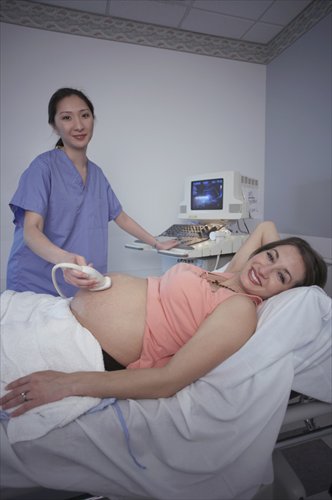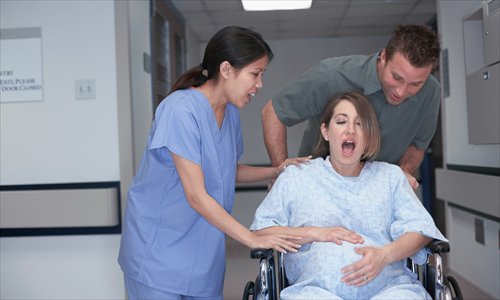How expecting moms from other countries have made Chinese childbirths their own

Beijing's ever-improving medical services for new moms, especially in international and private Chinese hospitals, has led to more expats deciding to have their babies in China. Photo: IC
When 31-year-old American Lauren Williamson, who had been living in Beijing with her British husband for more than five years, found out she was pregnant last February, this was her first thought: We need to move back home.
"This is my first child, everything is new to us, and I didn't want anything to go wrong, or have any miscommunication," Williamson says. "I knew I needed to find a hospital where I would find the environment really comfortable."
Comfort wasn't the first word that sprang to mind when Williamson thought of Chinese hospitals. Having visited Beijing's overcrowded public hospitals in the past, she knew how chaotic they could be. She'd also heard stories from friends who'd given birth in public Chinese hospitals about the long lines, rushed appointments with doctors and somewhat less-than-private consultations, none of which sounded appealing to her.
"The sheer volume of people in China meant we wouldn't get the kind of personalized service that we would get at hospitals in the West," she said.
Pregnancy and all its potential complications can be a terrifying prospect for any new mother, but giving birth in a foreign country, far from your family and friends, is even more daunting.
The language barrier is just one of the obstacles foreign women need to overcome. Delivery methods and cultural differences, when it comes to pregnancy, giving birth and the post-delivery period, may all vary widely from the norms in their home countries. However, Beijing's ever-improving medical services and the variety of options for care have made the adjustment easier over the years.

Differences between China and the West when it comes to approaches to childbirth and maternity care can pose challenges for some expat moms. Photo: IC
Finding international maternity services
Though Williamson says she was close to booking a flight home, after talking the matter through with her husband, they decided to have the baby in Beijing.
"We have lived in Beijing for so many years," she says. "We have steady jobs and an apartment here. We decided we had to live our lives the way they were, and not let pregnancy interrupt that."
Once they started looking, the couple soon found there was no lack of options that offered Western-style maternity services, including both international hospitals and private Chinese hospitals.
They finally decided on Beijing United Family Hospital after finding an American doctor there who they liked.
In the end, Williamson was satisfied with the service she received in Beijing.
"I felt that the quality of care I got in Beijing was actually better than I could have gotten in the US," she says. "Like, I got an independent room, which in the US would have cost more, and most of the staff spoke good English, so it was easy to communicate."
Williamson was also happy with the medical care itself. "I was relieved that the treatment I get at the international hospital was pure West," she says. "The ultrasounds I got, even the way the nurses swaddled my son, was pure West."
Of course, that didn't eliminate all problems. One that they soon discovered was that Williamson was Rh-negative, meaning her red blood cells were missing a certain protein present in the majority of people. Though there are normally no health concerns associated with being Rh-negative, it can present a problem during pregnancy, as incompatible Rh statuses between mother and child can result in the mother's immune system attacking the baby's blood during exposure, say during delivery.
There's an easy solution: a drug called RhoGAM, which prevents the mother's body from reacting against Rh-positive blood. Unfortunately for Williamson, Rh-negative blood is so rare on the Chinese mainland, that the shot isn't yet available here.
"The doctor told us that we could order the injection from Hong Kong for 8,000 HKD ($1,031) as an individual, because the hospital could not order it, as the government hasn't yet issued a license for the injection," she says. "We finally decided to go back to the US for the injection, where it costs $200."
Another hurdle was the lack of options when it came to things like prenatal vitamins. In the US, she would have had 30 different options, while in China her choices were limited to just three brands. Likewise, she says she had trouble finding maternity clothes that fit, as Chinese sizes are generally smaller.
Sharee Hebert, a 37-year-old math teacher at an international school, also chose to have her first baby in Beijing three years ago.
"I have lived in Beijing for 11 years," she says. "It's my home, so I had no doubts about having the baby here."
For her delivery, she chose a private women and children's hospital called HarMoniCare, as the fees were much cheaper.
In all, she says she paid around 52,000 yuan for the entire maternity package, about half the price of international hospitals.
"If you choose a women and children's hospital, make sure it has a plan for where to send the mother or baby if there are any emergency complications," Hebert suggested.
Though international hospitals offer top-level care, their staggering prices - and the fact that only insurance plans with high annual fees cover maternity - mean that they're unaffordable for many.
The biggest obstacle for Hebert to having her baby there was the language barrier, though she says it didn't prove much of a problem. When needed, the hospital would provide a translator, and Hebert also brought a Chinese friend along for each examination to translate.
Both Williamson and Hebert say they have also benefited from Beijing's tight-knit community of foreign mothers.
"For instance, there's Beijing Moms, a group on Yahoo Beijing, where women, mostly foreign moms, can talk about things like breast-feeding or pass on stuff to each other," Hebert says. "I have made many mom friends there."
Williamson, meanwhile, says she's gotten lots of useful information from a WeChat group dedicated to breast-feeding moms called La Leche League, whose members meet in person around once month.
"The group is very helpful," Williamson says. "The moms talk about stuff like which positions are better for breast-feeding, and what kind of clothes they can wear if they want to feed in public places."
Chinese maternity culture
One thing many expat moms in Beijing struggle with is the Chinese medical establishment's different approach to childbirth.
According to a China News Agency report in July 2014, the C-section rate in China is around 50 percent, the highest in the world. The World Health Organization advises keeping the rate under 15 percent. As a result, some expats who've given birth in China believe that they were subjected to unnecessary C-sections.
Hebert is one example. After two days of difficult labor with no results, the baby began to show signs of distress, and doctors decided to perform a C-section to keep the baby from danger.
"It was an emergency situation, but I think something else could have been done," she says. "Like I suggested some other positions to help my pelvis open up bigger or a water birth, but the doctors said they had never tried it before."
Williamson adds that one reason she wanted a Western or a Western-trained Chinese doctor is that they would be less likely to resort to a C-section.
"I think it's because Chinese doctors aren't used to big babies," she said. "Like my friend's Chinese doctor started suggesting that she eat less when her baby reached six pounds because the doctor was afraid she might have trouble delivering. But my baby was 9.5 pounds and my doctor let me try a natural delivery."
There are other cultural differences that can prove vexing to expat moms. For instance, Hebert recalls that the nurse wouldn't let her turn on the air conditioner after giving birth, despite the more-than 30 C heat, because of the Chinese belief that it can cause sickness.
On a more positive note, Williamson recalls how her kind-hearted Chinese nanny would cook fish soup for her every day in an effort to keep her energy up and help her produce more breast milk. Even her Chinese neighbors got in on the action, advising her, as per Chinese culture, that she ought to stay in the house for a month after giving birth, and to refrain from showering or washing her hair, to avoid sickness.
Though Williamson didn't necessarily follow all of the advice, she appreciates the care it betrayed.
"China has a really baby-centered culture. Everywhere you go, people try to help pregnant women or parents with young children," she said.
But not all women are ready to take on the challenges of having a baby so far from home.
"I know some expats who've chosen to go back to their own countries to have babies because they are more comfortable with their own medical system, or just want to be close to their families," Hebert says.
For those who still plan to have a baby in China, Hebert suggests that they formulate a birth plan but understand that it might not go as planned, and that they will need to put their trust in the doctors.
"I liked my experience here. If I had to do it all over again, I don't think I would have done anything differently," she said.
Newspaper headline: Knocked up in Beijing